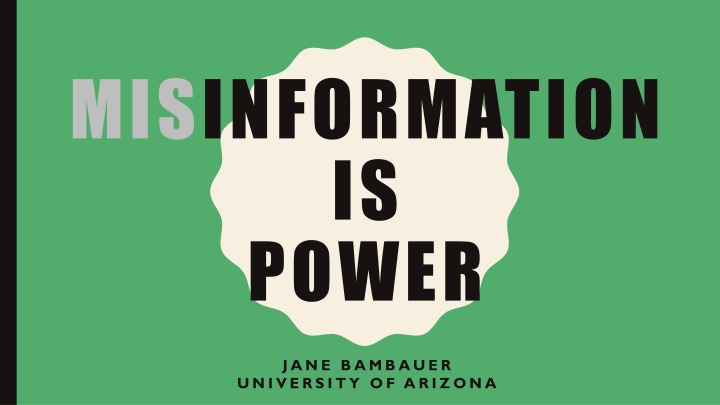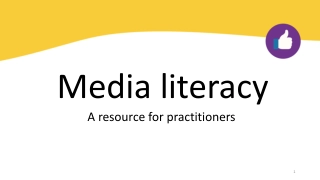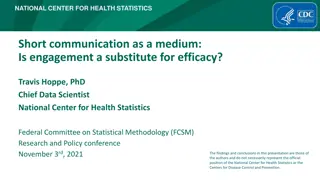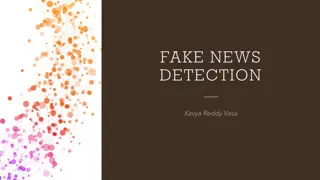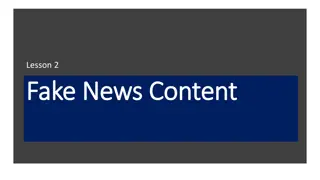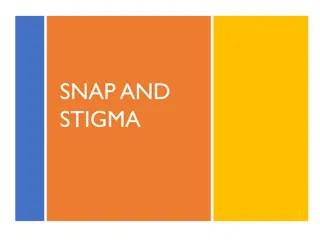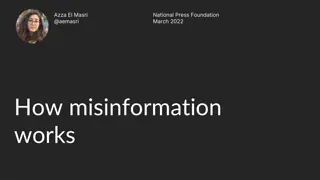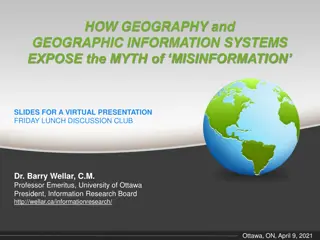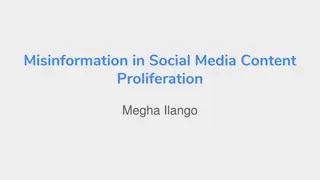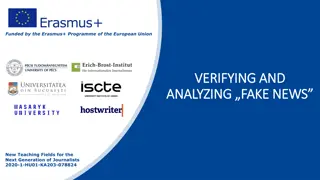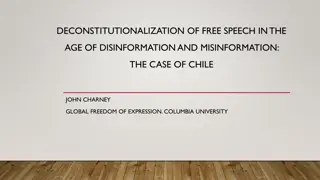Unraveling the Impact of Misinformation on Society
Delve into the complex web of factors contributing to misinformation in today's society, with a focus on the role of platforms like Facebook in spreading fake news and manipulating public opinion. Explore the challenges of testing empirical theories and understanding causation in an age where online content influences and reflects preexisting beliefs. Consider the implications of these issues on divisive politics and voting behavior, and reflect on the subtle yet significant effects of propaganda in shaping societal attitudes.
Download Presentation

Please find below an Image/Link to download the presentation.
The content on the website is provided AS IS for your information and personal use only. It may not be sold, licensed, or shared on other websites without obtaining consent from the author.If you encounter any issues during the download, it is possible that the publisher has removed the file from their server.
You are allowed to download the files provided on this website for personal or commercial use, subject to the condition that they are used lawfully. All files are the property of their respective owners.
The content on the website is provided AS IS for your information and personal use only. It may not be sold, licensed, or shared on other websites without obtaining consent from the author.
E N D
Presentation Transcript
MISINFORMATION IS POWER JANE BAMBAUER UNIVERSITY OF ARIZONA
HOW DID WE BECOME DUMB, DIVIDED, AND PETULANT? Facebook facilitated the spread of foreign- generated fake news Facebook facilitated the spread of propaganda and manipulation Facebook facilitated the spread of popular, authentically believed misinformation Promoting zero-sum thinking and identity group grievances
DISCLAIMERS These are empirical theories They are difficult to test My arguments are based on weakly-held convictions that fill the gaps in our evidence base
Facebook failed to do X Manipulation Change in voting behavior/ divisive politics
BENKLER ET AL. Facebook failed to do X Manipulation Change in voting behavior/ divisive politics (Awkward for scholars: must acknowledge problems in the substance of conservative mainstream media)
QUESTIONS IN CAUSATION Facebook failed to do X Manipulation Change in voting behavior/ divisive politics
BUT-FOR CAUSATION Facebook failed to do X Manipulation Change in voting behavior/ divisive politics To what extent does online content reflect preexisting beliefs, and to what extent does it influence them?
A BRIEF LOOK AT FACEBOOK ADS People who saw an ad and then purchased the product Would have anyway Would not have purchased, no regrets Would have purchased different brand Would not have purchased, regrets
BY ANALOGY People who saw propaganda on Facebook and then engaged in divisive politics Would have anyway Would not have done something similar, but no regrets Would have done something similar anyway Would not have done something similar, regrets
PROXIMATE CAUSATION Facebook failed to do X Manipulation Change in voting behavior/ divisive politics Who is responsible for the adoption of bad ideas?
PROXIMATE CAUSATION Who is responsible for the adoption of bad ideas? Facebook failed to do X Manipulation Change in voting behavior/ divisive politics Manipulation = Directly influencing someone s beliefs, attitudes, or preferences in ways that fall short of what an empathic observer would deem normatively appropriate in context Disinformation, Propaganda, and Commercial Bullshit
PROXIMATE CAUSATION Who is responsible for the adoption of bad ideas? Facebook failed to do X Manipulation Change in voting behavior/ divisive politics Manipulation = Directly influencing someone s beliefs, attitudes, or preferences in ways that fall short of what an empathic observer would deem normatively appropriate in context Disinformation, Propaganda, and Commercial Bullshit are small potatoes
MISINFORMATION IS KEY Facebook failed to do X Misleading pessimism Change in voting behavior/ divisive politics Threats are overrepresented in all media: Discrimination Political Correctness Stalling economic mobility Immigration and global trade Technology
MISINFORMATION IS KEY Facebook failed to do X Misleading pessimism Change in voting behavior/ divisive politics Threats are overrepresented in all media: Discrimination Political Correctness Stalling economic mobility Immigration and global trade Technology
MISINFORMATION IS KEY Facebook failed to do X Misleading pessimism Change in voting behavior/ divisive politics
